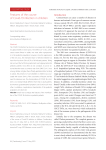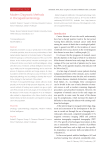Descriptive study. Рубрика в журнале - Cardiometry

Features of the course of COVID-19 infection in children
Статья научная
The COVID-19 infection has become an unexpected challenge for global health in recent years. The SARS-CoV-2 virus, which causes severe illness in adults, was most often asymptomatic in the pediatric population. However, since the appearance of the new virus, the estimated share of infected children has risen from less than 2% to 8.5% of all infected patients. Taking into account the fact that asymptomatic and oligosymptomatic pediatric patients most often do not complain, it can be assumed that the exact occurrence rate of the SARS-CoV-2 virus among children is higher than officially published data. Similarly to adults, the presence of comorbidities in children was associated with severe forms of the coronavirus infection and the need for intensive care. The clinical pattern of COVID-19 in children is not fundamentally different from that in adult patients, but however, gastrointestinal symptoms are found much more often. In addition, complications characteristic of the pediatric population are observed. The aim hereof was to analyze the features of the manifestation of the COVID-19 infection in pediatric patients.
Бесплатно

Modern diagnostic methods in oncogastroenterology
Отчет
Diagnostic procedures occupy a special place in the activities of medical specialists, since the accuracy and timeliness of their implementation depends on the determination of the patient’s treatment package, as well as the prognosis of the course of the disease. In the modern period, innovative technologies come to the aid of doctors, one of which is artificial intelligence. Along with other areas of medicine, artificial intelligence (AI) technology is widely used in oncogastroenterology and is used in the process of diagnosis, prediction and image analysis. AI makes it possible to determine with high accuracy the features of the diagnosed pathology and, accordingly, to develop the most effective strategy for the treatment of the patient. The future of oncogastroenterology is based, without a doubt, precisely on the results of high-precision diagnostics, since advanced methods of treating cancer patients can give a significant effect precisely at the early stages of the development of this disease. For this reason, the appeal to AI as an indispensable assistant to diagnosticians in the future should be widely implemented at all levels of polyclinic and inpatient oncological care to the population.
Бесплатно

